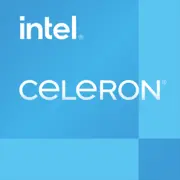Intel Celeron G1630

Intel Celeron G1630: A Budget Processor for Basic Tasks in 2025
April 2025
1. Key Features: Ivy Bridge Architecture and Modest Performance
The Intel Celeron G1630, released in 2013, belongs to the Ivy Bridge generation. Despite its age, it is still found in budget builds due to its low cost (around $30-40 for a new unit in stock).
Technical Details:
- Manufacturing Process: 22 nm — an outdated standard (modern CPUs use 7-10 nm).
- Cores and Threads: 2 cores, 2 threads. It's weak for multitasking — for example, running a browser with 10 tabs and an antivirus already causes stalling.
- L3 Cache: 2 MB. A minimum even for office tasks.
- TDP: 55 W. Energy efficiency is at the level of the 2010s.
- Integrated Graphics: Intel HD (Ivy Bridge generation). Supports up to 1080p resolution, but is unsuitable for 4K video or streaming.
Performance:
- Geekbench 6: 372 (Single-Core), 608 (Multi-Core). In comparison, the modern Celeron G6900 (2023) scores over 1200 points in Single-Core.
- In real scenarios: Word, Excel, YouTube (1080p) run steadily. Attempting to open Photoshop or run a browser game like Brawl Stars leads to delays.
2. Compatible Motherboards: Hunting for Rare Chipsets
The Celeron G1630 utilizes the LGA 1155 socket, which has long been discontinued.
Compatible Chipsets:
- H61, B75, H77, Z75, Z77.
- Example Models: ASUS P8H61-M LE, Gigabyte GA-B75M-D3H.
Selection Features:
- New Boards: Rare. Individual pieces on Amazon or AliExpress cost $50-70, but their quality is questionable.
- Used Market: The main source. Prices range from $20-40.
- OS Compatibility: Motherboards often require manual BIOS updates to work with Windows 11.
Tip: Check for support of SATA III and USB 3.0 (available in B75 chipsets and above). This is critical for SSDs.
3. Memory: Only DDR3 — Speed Limitation
The processor supports DDR3-1333/1600 MHz.
Details:
- Maximum Capacity: 32 GB (theoretically), but in practice, most H61 boards are limited to 16 GB.
- Modern Standards: DDR4 and DDR5 not supported.
- Real Speed: Even with two modules in dual-channel (for example, 2x4 GB), performance in gaming or rendering will remain low.
Example: In a system with 8 GB DDR3-1600 and an SSD, loading Windows 10 takes about 15 seconds, but simultaneous use of Chrome and Excel fills the memory.
4. Power Supply: Minimal Costs
With a TDP of 55 W, the processor does not require a powerful PSU.
Recommendations:
- Power Rating: 300-400 W is sufficient. For example, an EVGA 400 W (around $45).
- Power Connector: 4-pin connector (not the 8-pin used by modern CPUs).
- Cost-saving: You can use a PSU from an old PC if it's functional.
Important: If a discrete graphics card (like the GT 1030) is planned, choose a PSU with a 6-pin PCIe connector.
5. Pros and Cons: Who Does This Suit?
Pros:
- Price: $30-40 — cheaper than many smartphones.
- Power Consumption: Suitable for a PC that runs 24/7 (like a media center).
- Integrated Graphics: No need for a separate graphics card.
Cons:
- Outdated Architecture: Does not support AVX2 or AES-NI instructions — issues with modern software.
- No Upgrade Path: The LGA 1155 socket is dead.
- Weak Multithreading: 2 threads is a 2010 standard.
6. Use Cases: Office, Media, But Not Gaming
- Office Tasks: Word, Excel, email — no problems.
- Multimedia: Watching YouTube (1080p), Netflix. Cannot handle 4K.
- Light Gaming: Minecraft (at low settings), Half-Life 2. Modern titles like Fortnite even at minimum settings are a slideshow.
- Home Server: Due to the low TDP, it's suitable for NAS using OpenMediaVault.
Real Example: A user built a PC based on the Celeron G1630 for parents — document work and Zoom. Result: the system handles it, but during video calls, the load reaches 90-100%.
7. Comparison with Competitors: Budget Segment
AMD Athlon 3000G (2020):
- 2 cores/4 threads, Vega 3 graphics, DDR4 support.
- Geekbench 6: ~600 (Single), ~1100 (Multi).
- Price: $60-70 (new). Wins on all parameters.
Intel Pentium Gold G6400 (2020):
- 2 cores/4 threads, UHD 610, DDR4-2400.
- Geekbench 6: ~900 (Single), ~1700 (Multi).
- Price: $70-80.
Conclusion: The Celeron G1630 lags behind even budget newcomers, but wins in price.
8. Practical Assembly Tips
- SSD is a Must: Kingston A400 240 GB ($25) will speed up the system.
- Cooling: The stock cooler is sufficient, but replace the thermal paste (e.g., Arctic MX-4).
- Operating System: Windows 10 LTSC or Linux (Ubuntu/Lubuntu). Windows 11 is not officially supported.
- Security: Install a lightweight antivirus (e.g., Avira Free).
Example Build:
- CPU: Celeron G1630 ($35)
- Motherboard: Used ASUS H61 ($30)
- Memory: 8 GB DDR3-1600 ($15)
- Storage: 240 GB SSD ($25)
- PSU: EVGA 400 W ($45)
- Total: ~$150.
9. Conclusion: Who is the Celeron G1630 Suitable for in 2025?
This processor is a choice for:
- Budget Users: Building a PC for basic tasks for $150.
- Secondary Systems: Media center, terminal for cafes, backup server.
- Retro Computing Enthusiasts: Building a PC in the style of the 2010s.
Why Not? If you need comfort in multitasking, support for modern standards, or upgrade options — better to add $50-70 and get an AMD Athlon 3000G or a used Core i5 from the 4th generation.
The Celeron G1630 may not be powerful, but it’s a durable chip that proves that even 12 years after release, there are tasks for which it remains relevant.
Basic
CPU Specifications
Memory Specifications
GPU Specifications
Benchmarks
Compared to Other CPU
Share in social media
Or Link To Us
<a href="https://cputronic.com/cpu/intel-celeron-g1630" target="_blank">Intel Celeron G1630</a>